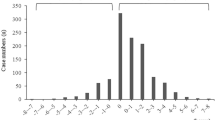Abstract
The purpose of this study was to describe the association between the regularity of sleep patterns for first-time Japanese mothers in the early postpartum period and the sleep and wake activity of their infants and partners. Longitudinal time-series studies of 101 healthy Japanese childbearing couples were conducted between May 2002 and January 2003. Data were obtained from couples at 32–6 weeks pregnancy and 4–5 weeks after birth. The questionnaire packet for each father and mother included a demographic questionnaire, a sleep-wake log for 7 days, a social rhythm metric for 7 days and a morningness-eveningness questionnaire. A four-stage hierarchical multiple regression analysis was performed in which the mother’s sleep-wake rhythm strength was the dependent variable. The variance in postpartum sleep-wake rhythm strength for first-time mothers was explained by three predictor variables. Household income, the mother’s chronotype during pregnancy and the father’s daily social rhythm at 4–5 weeks after birth made unique contributions to the variance (24.7%) in the mother’s sleep-wake rhythm strength at 4–5 weeks postpartum. A mother’s own tendency to be a morning or evening chronotype and the regularity of the father’s daily schedule of activities appear to influence first-time mother’s sleep-wake rhythm strength during early postpartum recovery more than disruptions from the infant’s sleep-wake activity itself. Health-care providers should counsel couples on how factors associated with the parents themselves may impact on the regularity of a mother’s sleep patterns.
Similar content being viewed by others
References
Parmelee AH, Wenner WH, Schulz HR. Infant sleep patterns: from birth to 16 weeks of age. J. Pediatr. 1964; 65: 576–82.
Yamazaki A, Lee K, Kennedy H, Weiss SJ. Sleep-wake cycles, social rhythms, and sleeping arrangement during Japanese childbearing family transition. J. Obstet. Gynecol. Neonatal Nurs. 2005; 34: 342–8.
Yamazaki A, Lee K, Kennedy H, Weiss SJ. Parent chronotypes and sleeping crying/fussing in 4–5 week infants. Sleep Biol. Rhythms 2005; 3: 158–61.
Honma K, Honma S, Hiroshige T. Seitairhizumu no kenkyuu [Biological rhythm research]. Hokkaidodaigakuto-syokannkoukai 1989.
Ehlers CL, Frank E, Kupfer DJ. Social Zeitgebers and biological rhythms. Arch. Gen. Psychiatry 1988; 45: 948–52.
Shinkoda H, Matsumoto K, Park YM. Changes in sleep-wake cycle during the period from late pregnancy to puerperium identified through the wrist actigraph and sleep logs. Psychiatry Clin. Neurosci. 1999; 53: 133–5.
Lee KA, Zaffke ME, McEnany G. Parity and sleep patterns during and after pregnancy. Obstet. Gynecol. 2000; 95: 14–18.
Swain AM, O’Hara MW, Starr KR, Gorman LL. A prospective study of sleep, mood, and cognitive function in postpartum and nonpostpartum women. Obstet. Gynecol. 1997; 90: 381–6.
Quillin S. Infant and mother sleep patterns during 4th postpartum week. Issues Compr. Pediatr. Nurs. 1997; 20: 115–23.
Wambach KA. Maternal fatigue in breastfeeding primiparae during the first nine weeks postpartum. J. Hum. Lact. 1998; 14: 219–29.
Campbell I. Postpartum sleep patterns of mother-baby pairs. Midwifery 1986; 2: 193–201.
Nishihara K, Horiuchi S. Changes in sleep patterns of young women from late pregnancy to postpartum: relationships to their infants’ movements. Percept. Mot. Skills 1998; 87: 1043–56.
Nishihara K, Horiuchi S, Eto H, Uchida S. Mothers’ wakefulness at night in the post-partum period is related to their infants’ circadian sleep-wake rhythm. Psychiatry Clin. Neurosci. 2000; 54: 3.
Hertz G, Fast A, Feinsilver SH, Albertario CL, Schulman H, Fein AM. Sleep in normal late pregnancy. Sleep 1992; 15: 246–51.
Galvin KM, Brommel BJ. Family Communication. Harper Collins: New York, 1991.
Cowan CP, Cowan PA. When Partners Become Parents: the Big Life Change for Couples. Basic Books, New York, 1992.
Monk TH, Essex MJ, Smider NA, Klein MH, Lowe KK, Kupfer DJ. The impact of the birth of a baby on the time structure and social mixture of a couple’s daily life and its consequences for well-being. J. Appl. Soc. Psychol. 1996; 26: 1237–58.
Gay CL, Lee KA, Lee SY. Sleep patterns and fatigue in new mothers and fathers. Biol. Res. Nurs. 2004; 5: 311–18.
Elek SM, Hudson DB, Fleck MO. Expectant parents’ experience with fatigue and sleep during pregnancy. Birth 1997; 24: 49–54.
Troy NW. A comparison of fatigue and energy levels at 6 weeks and 14–19 months postpartum. Clin. Nurs. Res. 1999; 8: 135–52.
Rogers AE, Caruso CC, Aldrich MS. Reliability of sleep diaries for assessment of sleep-wake patterns. Nurs. Res. 1993; 42: 368–72.
Sadeh A. Evaluating night waking in sleep-disturbed infants: a methodological study of parental reports and actigraphy. Sleep 1996; 19: 757–62.
Monk TH, Flaherty JF, Frank E, Hoskinson K, Kupfer DJ. The social rhythm metric: an instrument to quantify the daily rhythms of life. J. Nerv. Ment. Dis. 1990; 178: 120–6.
Monk TH, Kupfer DJ, Frank E, Ritenour AM. The social rhythm metric (SRM): measuring daily social rhythms over 12 weeks. Psychiatry Res. 1991; 36: 195–207.
Horne JA, Ostberg O. A self-assessment questionnaire to determine morningness-eveningness in human circadian rhythms. Int. J. Chronobiol. 1976; 4: 97–110.
Ishihara K, Saitoh T, Inoue Y, Miyata Y. Validity of the Japanese version of the morningness-eveningness questionnaire. Percept. Mot. Skills 1984; 59: 863–6.
Ishihara K, Miyashita A, Inugami M, Fukuda K, Yamazaki K, Miyata Y. The results of investigation by the Japanese of morningness-eveningness questionnaire. Jpn.J. Psychol. 1986; 57: 87–91.
Elek SM, Hudson DB, Fleck MO. Couples’ experiences with fatigue during the transition to parenthood. J. Fam. Nurs. 2002; 8: 221–40.
Adams BN, Cromwell RE. Morning and night people in the family: a preliminary statement. Fam. Coord. 1978; 27: 5–13.
Breithaupt H, Hildebrandt G, Dohre D, Josch R, Sieber U, Werner M. Tolerance to shift of sleep, as related to the individual’s circadian phase position. Ergonomics 1978; 21: 767–74.
Author information
Authors and Affiliations
Corresponding author
Rights and permissions
About this article
Cite this article
Yamazaki, A. Family synchronizers: Predictors of sleep-wake rhythm for Japanese first-time mothers. Sleep Biol. Rhythms 5, 218–225 (2007). https://doi.org/10.1111/j.1479-8425.2007.00274.x
Received:
Accepted:
Published:
Issue Date:
DOI: https://doi.org/10.1111/j.1479-8425.2007.00274.x




